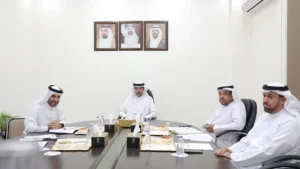
We recently had the opportunity to interview Osman Ali Aboud Ahmed, Director of Quality at AECOM in Riyadh, Saudi Arabia. With over two decades of experience in Quality & HSE management, Organizational Excellence, and Continuous Improvement, he has led multi-billion-dollar projects across diverse sectors.
Alongside being a certified PMP, RMP, and Lead Auditor (ISO 9001, 14001, 45001), Osman is also a seasoned speaker, having presented at numerous prestigious conferences and global forums. As a distinguished professional, Osman Ali Aboud Ahmed is actively involved and plays an instrumental role in professional quality networks and publications.
Spark Behind the Journey
We started the session by asking, “What first inspired you to pursue your current industry or professional path? Was there a defining moment or influence that shaped your direction?”
Osman Ali Aboud Ahmed shared, “My journey into the field of quality and operational excellence began with a natural inclination toward precision, process efficiency, and structured problem-solving. As a Mechanical engineering graduate, I was always fascinated by the link between design intent and real-world execution and how the smallest variation in process or material could influence performance and reliability.
I have long admired the importance of quality function from an early stage in my career in Sudan as a Mechanical engineer. However, the defining moment came during my tenure at SOFCON, where I worked on the Saudi Aramco Oil and Gas Projects. Being part of the Saudi Aramco quality management system exposed me to the importance of a systematic quality management approach in ensuring safety, consistency, and sustainability. I saw firsthand how robust quality systems could transform complexity into predictability, and that realization ignited my passion for building and improving such systems.
From that point onward, I dedicated my career to advancing quality and HSE management systems, integrating Lean Six Sigma principles, and promoting a culture of excellence. What continues to inspire me is the measurable impact quality has, not only on business outcomes but also on people’s safety, environmental stewardship, and customer satisfaction.”
Navigating through Challenges
To learn how Osman Ali Aboud Ahmed successfully handled the challenges in his career or business, we asked him to share his experiences.
Osman Ali Aboud Ahmed explained, “A pivotal challenge I faced was during my time leading one of the Saudi Vision 2030 construction management programs. The project involved multiple contractors and consultants working concurrently on complex infrastructure and heritage restoration sites. The challenge was the lack of real-time accessibility to approved documentation and control over document versions across distributed teams, an issue that frequently led to rework and delays.
To overcome this, I spearheaded the implementation of an innovative QR code-based document management system. Each approved document, whether a drawing, inspection checklist, ITP, or method statement, was assigned a unique QR code. This allowed engineers and supervisors at the site to instantly verify document validity via mobile devices, ensuring that only the latest approved versions were used.
Additionally, I introduced Non-Conformance Report (NCR) tagging and Root Cause Analysis (RCA) workshops. NCR tags physically mark non-conforming areas, visually alerting teams and preventing further work until issues are resolved. Weekly RCA sessions promoted collaboration and knowledge sharing, turning lessons learned into actionable improvements. The combined effect of these innovations was a measurable reduction in recurring quality issues, improved audit performance, and enhanced trust between client and contractor teams. This achievement was later recognized by senior leadership.”
Potential Trends of the Industry
We further asked, “What key trends or changes do you foresee shaping the future of your industry over the next 3–5 years?”
Osman Ali Aboud Ahmed responded, “The construction and infrastructure sector is currently undergoing one of its most transformative phases, driven by the convergence of digital transformation, sustainability imperatives, and evolving regulatory frameworks.
Over the next 3–5 years, several key trends will redefine industry standards. The industry will have quality 4.0 and data-driven decision-making with the integration of AI, IoT, and big data analytics. This will shift quality management from reactive correction to proactive prevention. Additionally, Environmental, Social, and Governance (ESG) performance will increasingly influence project approvals and client partnerships, including carbon footprint management, circular economy principles, and sustainable material tracking in quality systems.”
“Also, real-time simulation and digital twin technologies will enable enhanced project monitoring, lifecycle management, and performance benchmarking, redefining how we approach quality assurance and risk control. And lastly, human capital and knowledge management will be a crucial part. As automation rises, knowledge retention and competency development will become vital. Continuous professional development and digital literacy among engineers will distinguish high-performing organizations from others.
I foresee that the organizations capable of aligning digital transformation, human expertise, and sustainability within their quality frameworks will lead the next era of excellence,” he added.
Plans we asked Osman Ali Aboud Ahmed
To learn Osman Ali Aboud Ahmed’s long-term aspirations for his company or role, and strategies to reach them, we asked him to offer a glimpse of the same.
Osman Ali Aboud Ahmed replied, “My long-term aspiration is to elevate the organization’s quality and operational excellence maturity to world-class standards and create a model that seamlessly integrates ISO-based systems, Lean methodologies, and digital transformation initiatives. I envision a future where quality is not a compliance requirement but an embedded mindset that drives innovation, customer experience, and sustainability.
To achieve this, I am focusing on several strategic pillars. Firstly, my goal is to lead structured training and awareness programs to ensure that every employee understands their role in delivering quality. Through workshops, I have already trained hundreds of engineers, contractors, and client representatives.”
Osman even mentioned, “Moreover, digitization of quality systems will help for real-time tracking of performance metrics, NCRs, and audit findings. I’m looking forward to embedding Lean Six Sigma and RCA frameworks into daily operations to drive measurable performance gains and cost reduction. And lastly, I’ll adopt an excellence framework, aligning the organization with global excellence models such as EFQM and Quality 4.0, to ensure readiness for international benchmarking and awards.
By executing these strategies, I aim to establish a legacy of sustainable excellence that contributes to both organizational growth and national development goals under Saudi Vision 2030.”
Revolutionizing Businesses with AI
With the digital revolution reshaping the industries, we were interested to learn more about Osman Ali Aboud Ahmed’s perspective on the influence of the emerging technologies on his industry and business model
Osman Ali Aboud Ahmed commented, “Artificial Intelligence (AI) and emerging technologies are fundamentally reshaping the construction and quality management landscape. I see them as enablers of smart, data-informed decision-making rather than mere automation tools. In the near future, AI-driven platforms will analyze vast amounts of site and inspection data to predict quality deviations, safety risks, and schedule delays. Machine learning algorithms will continuously improve inspection accuracy, while drones and IoT sensors will offer real-time site condition monitoring.
Furthermore, Building Information Modeling (BIM) integrated with AI will allow for automated clash detection, digital twin simulations, and lifecycle optimization which will enhance coordination between design, construction, and maintenance phases. In the realm of quality auditing, AI tools can already assist in automating document reviews, analyzing audit findings, and recommending corrective actions based on historical data. This will not only save time but also raise the overall precision and consistency of quality evaluations.
In summary, emerging technologies will redefine the role of quality leaders and transform them from auditors to data strategists, guiding organizations through predictive and preventive quality management systems.”
Values at the Root of Leadership
We also asked, “What are the core values or guiding principles that influence your decisions and the way your organization operates?”
“My leadership philosophy is deeply rooted in five guiding principles: Integrity, Accountability, Excellence, Collaboration, and Continuous Improvement. I uphold honesty and transparency in every decision and interaction, as quality without integrity has no foundation. Also, accountability is an important part of my leadership approach, as encouraging ownership at all levels ensures that everyone is responsible for outcomes, not just activities.
Pursuing excellence is a habit rather than a goal; consistently raising the bar in performance and innovation, alongside believing that sustainable success emerges from teamwork and stakeholder alignment. I prioritize open communication and shared goals across departments, clients, and contractors. And, viewing every challenge as an opportunity for learning and innovation ensures continuous improvement.
These principles guide how I lead teams, structure systems, and make decisions ensuring that every action aligns with the broader mission of organizational excellence and societal value creation,” Osman shared.
Embracing Innovative Practices
Innovation is paramount to staying ahead of the curve. So, we asked, “Can you share an innovative strategy or approach that helped your company stand out or achieve a breakthrough?”
Osman Ali Aboud Ahmed mentioned, “One of the most impactful innovations I led was the implementation of Non-Conformance (NCR) Tagging and QR-based document accessibility at project sites. The NCR Tagging System introduced a visual, site-level quality control mechanism where every non-conforming area was tagged and digitally tracked. This immediate visibility prevented further activities in non-compliant zones and fostered accountability among construction teams.
Simultaneously, the QR system digitized document control for every quality document, such as ITP, MS, drawing, and inspection sheet, which could be accessed on-site through mobile scanning, ensuring that only the latest approved versions were used.
This dual strategy enhanced transparency, reduced rework, and streamlined communication between field and office teams. The result was a significant improvement in first-time-right performance and faster closeout of quality issues. The initiative not only earned internal recognition but also positioned my company as a regional leader in digital quality innovation, aligning perfectly with global Quality 4.0 standards.”
Evolution of Osman Ali Aboud Ahmed as a Leader
Lastly, we asked, “How has your leadership style evolved throughout your journey, and what lessons have shaped your approach to leading teams or businesses?”
“My leadership journey has evolved from a technical, process-driven approach to a strategic, people-centered philosophy. Early in my career, I focused heavily on compliance, procedures, and performance metrics. However, with time and experience managing large, multidisciplinary teams across organizations, I realized that the most sustainable results come from empowered and motivated people, not systems alone.
Today, my leadership style emphasizes trust, empowerment, and mentorship. I encourage open dialogue, recognize achievements, and involve my teams in decision-making processes. This has cultivated a strong sense of ownership and innovation among my teams. Key lessons that shaped my leadership include, listening before leading, understanding perspectives before making decisions, while embracing transformation as an opportunity for growth. I prefer leading by example, demonstrating integrity and discipline in every action. And, developing others, as leadership is not an authority but a service and empowerment.
Ultimately, I believe that a leader’s true legacy lies not in the systems they build, but in the leaders, they develop and the culture they leave behind.”
Connect with Osman Ali Aboud Ahmed on LinkedIn.
Also Read :-
Partner Tech Middle East — Building Smart Cities Across Cultures: Terry Wu
Kelly Hao: Breaking Barriers in Cross-border Collaborations with UDF IPS








